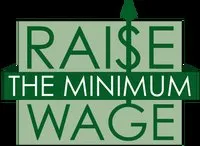It's Time for a National Minimum Wage Increase

With the passing of the ordinance to raise the minimum wage to $15 an hour in the city of Seattle, Washington, the time is ripe for the country to demand similar legislation on the federal level while the momentum is capable of driving policies in other areas of the country.
The Seattle City Council bravely passed the ordinance which would make it the highest minimum wage in the country. Although the increase won't go into effect until April 1, 2015 and will be phased-in over several years, it represents a movement that has been the agenda of labor leaders and activists for decades.
In February, President Obama signed an executive order requiring federal contractors to pay at least $10.10 an hour to its employees but the federal minimum wage remains at a stagnant $7.25 an hour. Although there are whispers in Washington regarding raising the federal minimum wage, the partisan deadlock in congress would likely stall any efforts and the legislation would likely exclude an index that would keep the increases competitive and automatically adjustable to the rising standard of living. There are currently eleven states that have adopted index policies that have increased minimum wages automatically up to 15 cents in each incarnation. These modest increases are estimated to benefit over 2.5 million workers in their respective states.
While the Seattle ordinance is a landmark, we cannot rely solely on our local and state governments to increase the minimum wage; there are currently five states with no minimum wage policies and employees in those states can only expect the federal standard of $7.25 an hour.
In 1938, President Franklin Roosevelt signed into law the federal minimum wage. The purpose of the law, which was enacted during the Great Depression, was to prevent poverty and to increase consumer purchasing power which leads to a stimulation of the economy. According to many economists, we are no longer in a recession, but increasing the federal minimum wage in 2014 will strengthen the economy by putting more money into the hands of people who are going to go out and make purchases. In Seattle alone, the increase is estimated to transfer over $3 billion dollars of wealth from the richest to the poorest, which will decrease poverty in the city by over 25%.
While it may seem like a no-brainer to increase the federal minimum wage to those in the labor movement, there are lobbyists, powerful interest groups and politicians that would like to see the practice diminished or even eliminated. The wealthiest members of our society are using popular media outlets to propagate their message of half-truths and misinformation. The most common message these figureheads emphasize in the media is that a majority of minimum wage workers are teens and therefore increasing the minimum wage would be futile since these workers will likely move on to college and no longer need low-wage jobs. It's no surprise that this message is false, as adults over the age of 20 account for 88% of all workers currently receiving the federal minimum wage. In addition, the notion that an increase would cause job loss is also false—a 2010 study by economists at the University of Massachusetts, University of California and the University of North Carolina measured the employment data of areas that had minimum wage increases between 1990 and 2006 and found no such link.
The facts are clear: a federal minimum wage increase will provide purchasing power to working people whom are not just teenagers working low-wage jobs and subsequently will not cost the American economy valuable jobs.
